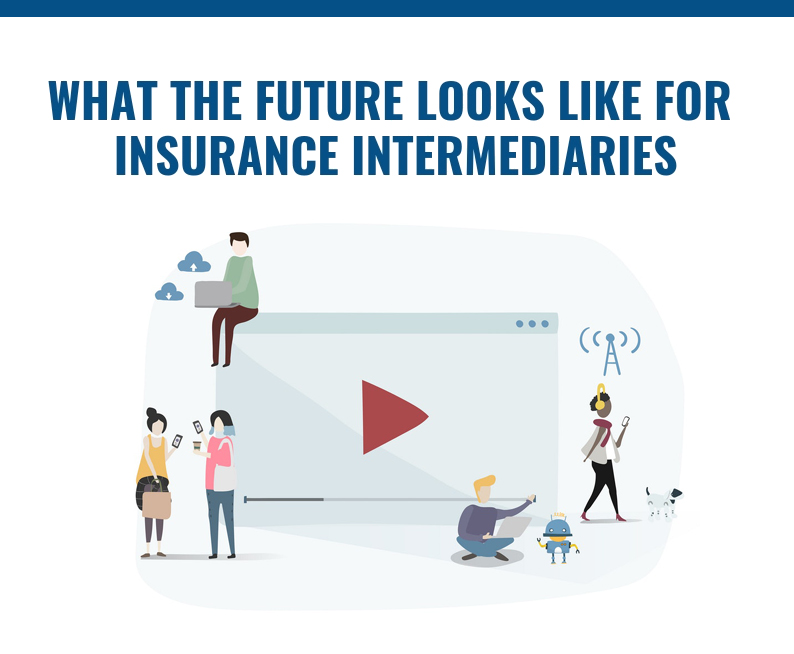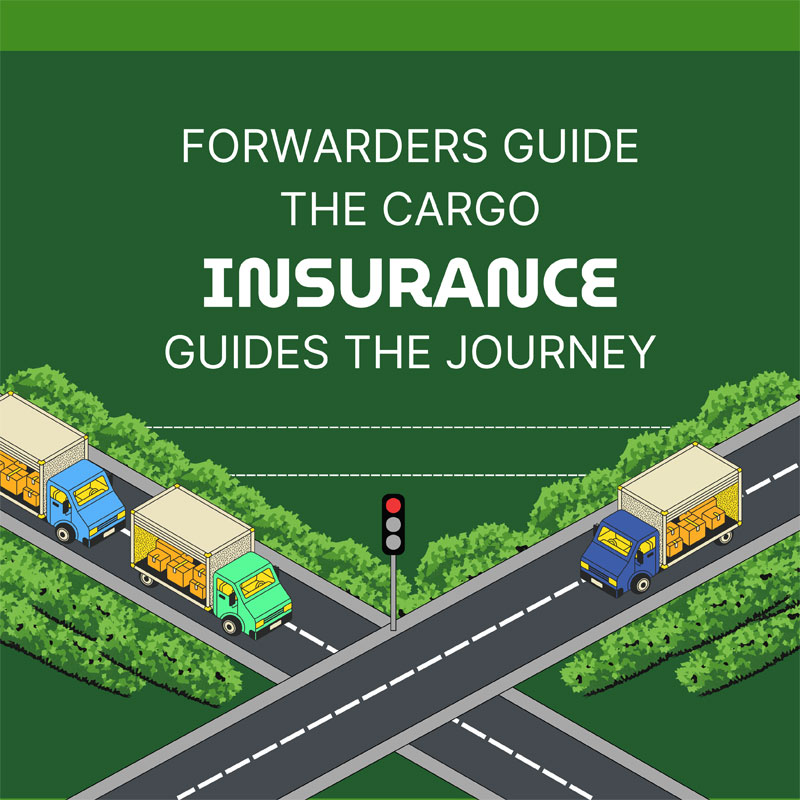24 SEPTEMBER, 2019 | 8 MIN READ.
What the Future Looks Like for Insurance Intermediaries

In 2017 there were 56 million millennials in the USA alone. They were all either already members of the workforce or actively seeking work. At the same time, according to a study by Bloomberg that analysed vast amounts of United Nations data, millennials will soon make up 31.5% of the planet's total population of 7.7 billion.
These people were born and bred using computers, tablets and smartphones, and they have no memory of the pre-digital age that so many older generations experienced. They're classic 'disruptors', people who make a significant impact in an industry within a short time. Millennials create new market and value networks wherever they go, disrupt existing ones, displace established market leaders, and demand new alliances.
All this means our world, the world of insurance intermediaries, is already changing fast. And it's only going to change more over the next decade. So what can you expect from the insurance intermediaries of the near future?
MILLENNIALS AND DIGITAL TECHNOLOGY
Every day thousands more millennials become business owners or enter the world of employment. They naturally expect things to be digital, and they're bringing their expectations to the commercial insurance landscape. It's likely they will increasingly expect better-personalised customer experiences from people like us, driven by digital data.
An excellent piece of research by LexisNexis which surveyed a group of commercial underwriting, product management and actuarial science professionals, reveals some important facts. 84% of commercial professionals say millennial entrepreneurs represent a strong trend in the market. 60% feel millennial entrepreneurs are an exciting opportunity for commercial insurance intermediaries. 81% of those asked are already making progress with plans to attract millennial entrepreneurs, and just over 20% say millennial entrepreneurs are an actual threat to their commercial insurance company.
Expectations are changing fast. Streamlined user experiences are the name of the game. But at the same time most commercial brokers are still carrying on business in the traditional way, often a time-consuming process involving the broker, the customer, data input and underwriting validation. It's a model that has served the insurance industry well for decades if not hundreds of years, but will the old ways still work for millennials who run businesses of their own? These people are often more used to doing business in a coffee shop via their tablet than the traditional way, over the phone or visiting an actual bricks and mortar office.

Personal insurance is already sold on a more modern basis. You can easily buy home owner or vehicle insurance using your smartphone, for example. A recent study by PwC revealed that 70% of business owners who bought their personal insurances online would also love to buy their commercial insurances online.
Some say the millennial generation insists on real-time, immediate gratification. The NexisLexis study showed 90% of commercial insurance professionals thought a fast turnaround was vital for a positive customer experience. And that's no surprise when you can make an order on Amazon and get it the next day with their Prime service. Or buy on Ebay and have it delivered the next day. This everyday level of speed and efficiency makes the traditional way of getting insured feel slow.
ROBUST DIGITAL TOOLS ARE HELPING THE CHANGE HAPPEN
 Change is already afoot thanks to digital tools. Some intermediaries are already taking new digital solutions to market. They're streamlining the quote and application process, and there are more direct distribution channels between insurers and business owners than ever before. A number of early-adopting commercial insurers and brokers are busy trying to meet millennial demands, investing in automation to collect accurate customer data which in turn drives slightly more streamlined commercial insurance purchases. And there's a vast amount of data to be tapped into, which cuts the amount of data input required and saves time. This data can also deliver a personalised experience, something the millennial generation loves.
Change is already afoot thanks to digital tools. Some intermediaries are already taking new digital solutions to market. They're streamlining the quote and application process, and there are more direct distribution channels between insurers and business owners than ever before. A number of early-adopting commercial insurers and brokers are busy trying to meet millennial demands, investing in automation to collect accurate customer data which in turn drives slightly more streamlined commercial insurance purchases. And there's a vast amount of data to be tapped into, which cuts the amount of data input required and saves time. This data can also deliver a personalised experience, something the millennial generation loves.
The problem with commercial insurances is that they really are complicated. The underwriting process often depends on a multitude of facts and evidence, and digital tech won't necessarily make the vital information gathering process any faster. It's important to get the underwriting itself right as well, to provide fair premiums and accurately identify the risks a business faces across all sorts of different areas. And there's no such thing as automatic cover or guaranteed acceptance in the commercial insurance world. We can't just press a button and give you cover.
MILLENNIALS ARE ONLY ONE OF THE MARKETS WE OPERATE IN
"While nearly half of shoppers obtain a quote via insurer websites, only 25% actually purchase their policy online. 50% close the purchase through direct contact with an agent, and 22% do so by phoning a call center." (JD Power)
We could go all-in and adopt wholesale automation and digitisation. But it's also important to remember that plenty of our commercial insurance clients are not millennials. They fall into older generations and they're not in the same kind of rush as the millennials to bring about digital change.
We think it's important to consider all our clients, whatever age or generation they happen to be. And – we admit it – we're cautious. Just because things are changing fast it doesn't mean we have to leap in and make dramatic changes ourselves. We'd rather wait for the early

adopters to solve the tricky issues the commercial insurance sector faces then adopt those technologies as soon as they've been proven to work, delivering the enhanced real-life customer experiences they promise to people like you.
We're watching digital's progress with great interest, and providing the same great service we've always given our clients. The moment we can see clearly what the future holds, we'll act. In the meantime it makes sense to let the early-adopting commercial carriers lead the way.
THE LAST WORD GOES TO GREG MCLAUGHLIN
We particularly like Greg McLaughlin's LinkedIn post on the subject. As he says: "Insurance is an extremely important financial product and although the internet gives us access to all the information in the world, we still need an expert to guide us along the way when we're looking to protect our most valuable assets. Because of the abundance of information on the internet, the broker of the future will shift their focus away from being a product expert and become an expert in building and managing relationships.
Customer engagement is what future brokers will need to be best at, and to do so they'll need to go back in time and take note of how brokers did business 50 years ago. Being accessible, personable, and trustworthy - but doing so through social media and social platforms. The insurance broker of the future will be a tech-savvy, one stop shop, relationship expert who uses technology resources to connect with consumers on a regular basis. So as long as there are people who need to manage risk, they're will always be insurance brokers.”


In the face of all this dramatic change in the market, we provide a reliable service that protects your business interests perfectly. If you need commercial insurance in Asia, let's discuss the options together.
Sources:
- https://www.marketwatch.com/story/millennials-are-taking-over-the-workforce-2018-04-16-11884422
- https://www.independent.co.uk/life-style/millennials-gen-z-outnumbered-2019-global-population-demographic-bloomberg-a8502251.html
- https://blogs.lexisnexis.co.uk/content/future-of-law/one-in-a-million-the-millennial-takeover
- https://press.pwc.com/News-releases/%20almost-half-of-smes-will-buy-insurance-online-within-five-years/s/a8e9af06-a351-471e-8266-837f3ac76c6d
- https://www.linkedin.com/pulse/what-future-insurance-broker-look-like-greg-mclaughlin
NOT UP-TO-DATE WITH OUR MONTHLY ARTICLES? FIND ISSUES HERE
IF IT CAN HAPPEN THERE, IT CAN HAPPEN ANYWHERE. OVERCONFIDENCE IS USUALLY HOW LOSS SNEAKS IN
AKTIV ASPAC AT MIAPEX 2025:
WHERE COMPLIANCE MEETS CONNECTION
TRANSPORT LITHIUM BATTERIES SAFELY – A RISK & INSURANCE PERSPECTIVE FOR FREIGHT FORWARDERS
ERRORS & OMISSIONS
GROWING A PICKLEBALL BUSINESS? DON’T OVERLOOK INSURANCE
MALAYSIA'S DRAMATIC MONSOON FLOODS - HOW INSURANCE HELPS
A YEAR TO REMEMBER - 2024 TYPHOONS, FLOODS, SHIPWRECKS AND SINKHOLES
PROSTHETIC PIRATE LEGS, RIVERBANK COLLAPSES, HALF A MILLION JOBS IN AI AND MORE
BOOMING INDUSTRY, POTHOLES, MID-AIR THEFT AND EMPLOYEE SHORTAGES
UNSEEN INSURANCE STORIES BEHIND THE HEADLINES
